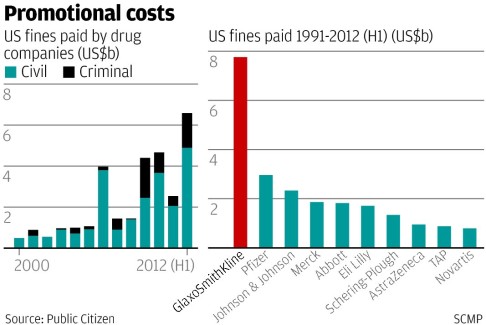The pharmaceutical industry routinely bribes doctors in the West to get its drugs prescribed, although the practice is given a thin façade
The media have been in a frenzy for the last few weeks over the detention of four GlaxoSmithKline employees in China.
Allegedly the four had channelled billions of yuan through a travel agency in order to bribe doctors to prescribe the British pharmaceutical company's drugs.
Reports have variously described the case as an attack on foreign companies by protectionist local authorities, a politically driven plot to marginalise the princeling children of late Communist Party general secretary Hu Yaobang, or a populist move by China's new leadership to bring down drug prices.

It may well be all three. China's leaders have always been adept at killing multiple birds with a single stone.
But one thing the Glaxo case is certainly not, despite what the reports make out, is uniquely Chinese.
When Glaxo chief executive Andrew Witty insisted last week he knew nothing about any bribe-paying by the company's staff in China, telling London's The Daily Telegraph "this looks like a number of individuals that have worked outside our systems", he was being disingenuous.
Sure, no doubt Witty was unaware of the details. But allegations that his employees were paying bribes to secure sales certainly came as no surprise. In the drug industry, it's almost standard practice.
Over the last 15 years or so, big pharmaceutical companies have switched from a model based on developing new drugs to one based on the aggressive marketing of existing products.
Marc-André Gagnon, a professor of public policy at Carleton University in Ottawa, likens the way the business works to three customers at a restaurant table. The first orders lunch. The second eats it. And the third pays the bill.
At this restaurant, however, the waiter is paid on commission. Not surprisingly, he presses the first customer to order the most expensive dishes on the menu. He may even promise him a couple of martinis on the house if he orders an especially lavish meal, whether or not it suits the second customer's digestion, or the third's pocket.
The first customer here is the doctor, responsible for prescribing drugs. The second is the patient. And footing the bill, the third is either the patient's insurance company or the state health-care system, depending on the country.
In reality, drug companies splash out on a lot more than martinis. The stories of 3 billion yuan (HK$3.78 billion) passed to a travel agent suggests Glaxo's staff were funding expensive jaunts to reward doctors for prescribing their drugs.
This is a time-honoured tactic in the West. Ostensibly, the doctor is attending a medical conference, which just happens to be in an exotic location. In reality he is enjoying a free holiday in a luxury beach resort.
Drug companies also pay doctors handsomely for consultancy services, writing papers, and participating in clinical trials. All are bribes for prescribing, or rather over-prescribing, drugs.
In China, where medical salaries can be just a few hundred yuan a month, doctors rely heavily on this extra income.
But the practice is just as common in other markets. According to Gagnon, in the US, the pharmaceutical industry spends some US$40 billion a year on promoting drugs to doctors. That's US$61,000 for each physician.
And drug companies often overstep the mark into illegality. Since 1991, they have paid US$29 billion in fines in the US alone.
By far the biggest offender is Glaxo. Just last year it paid US$3 billion to settle a US federal suit for paying bribes and unlawfully promoting three drugs. Overall, since 1991, Glaxo has paid a stunning US$7.6 billion in US penalties (see charts).
So, no, there is nothing especially Chinese in the latest drug-industry corruption case, except perhaps for the amount of media attention it is getting.
No comments:
Post a Comment